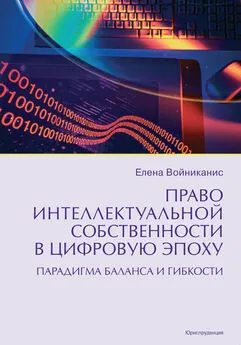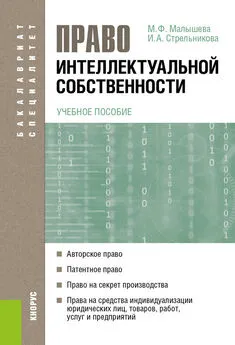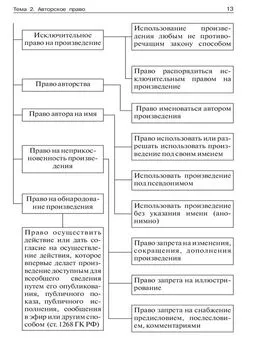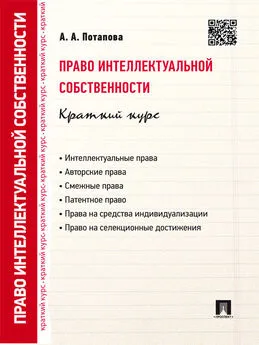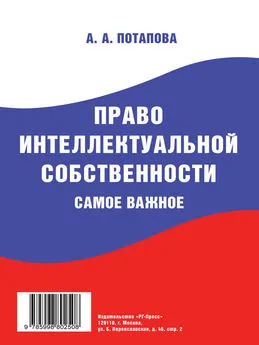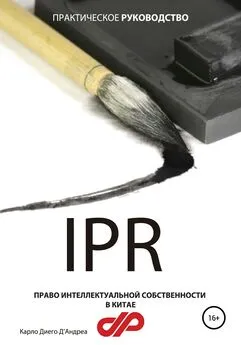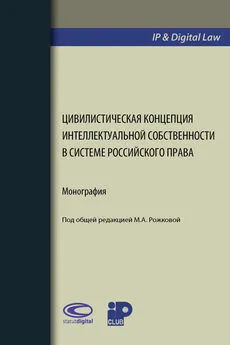Елена Войниканис - Право интеллектуальной собственности в цифровую эпоху. Парадигма баланса и гибкости
- Название:Право интеллектуальной собственности в цифровую эпоху. Парадигма баланса и гибкости
- Автор:
- Жанр:
- Издательство:Литагент «Юриспруденция»f52f92f6-56d8-11e5-8380-0025905a0812
- Год:2014
- Город:М.
- ISBN:978-5-9516-0680-8
- Рейтинг:
- Избранное:Добавить в избранное
-
Отзывы:
-
Ваша оценка:
Елена Войниканис - Право интеллектуальной собственности в цифровую эпоху. Парадигма баланса и гибкости краткое содержание
Настоящая книга является первым в российском и зарубежном праве исследованием, посвященным формированию новой парадигмы права интеллектуальной собственности под влиянием экономики информационного общества.
Автором обосновывается тезис о свободном потоке информации как ценности, требующей правовой защиты, а также о двух базовых принципах новой парадигмы – балансе интересов множественных субъектов и гибкости методов регулирования. Вывод о потребности в системном преобразовании права интеллектуальной собственности опирается на результаты анализа обширного фактического материала и тенденций в развитии международной практики регулирования.
Рекомендовано специалистам в праве интеллектуальной собственности, ученым и студентам, а также всем интересующимся проблемами правовых условий развития науки и культуры в цифровую эпоху.
Право интеллектуальной собственности в цифровую эпоху. Парадигма баланса и гибкости - читать онлайн бесплатно ознакомительный отрывок
Интервал:
Закладка:
Наш общий вывод заключается, следовательно, в том, что та система регулирования интеллектуальной собственности, к которой мы стремимся, свободная от непримиримых противоречий и органичная для информационного общества, должна отвечать как минимум двум критериям: балансу интересов и гибкости регулирования.
Список использованной литературы
1. Aarnio A. Paradigms in Legal Dogmatics. Toward a Theory of Change and Progress in Legal Science // Proceedings of the Conference on Legal Theory. Ed. by A. Peczenik, L. Lindahl and B. van Roermund. Dordrecht: Reidel, 1984. P. 25–38.
2. Abrams M.H. The Mirror and the Lamp: Romantic Theory and the Critical Tradition. New York: Oxford University Press, 1953.
3. Abramson B. Digital Phoenix: Why the Information Economy Collapsed and How It Will Rise Again. The MIT Press, 2005.
4. Alexy R. On the Structure of Legal Principles // Ratio Juris. 2000. Vol. 13 № 3. P. 294–304.
5. Alexy R. On Balancing and Subsumption. A Structural Comparison // Ratio Juris. 2003. Vol. 16 № 4. P. 433–449.
6. Alexy R. Theorie der Grundrechte. Baden-Baden, 1985.
7. Avila H.B. Theory of legal principles. Springer, 2007.
8. Baldini N. Negative effects of university patenting: Myths and grounded evidence // Scientometrics. 2008. Vol. 75. № 2. P. 289–311.
9. Bavasso A. Communications in EU antitrust law: market power and public interest. Kluwer Law International, 2003. P. 160–171.
10. Benkler Y. The wealth of networks: how social production transforms markets and freedom. Yale University Press, 2006.
11. Benkler Y. Commons-Based Strategies and the Problems of Patents // Science. 20 August 2004. Vol. 305. № 5687. P. 1110–1111.
12. Benkler Y. Sharing Nicely: On Shareable Goods and the Emergence of Sharing as a Modality of Economic Production // The Yale Law Journal. 2004. Vol. 114. P. 273–358.
13. Bennett C.J., Raab C.D. The Governance of Privacy. Ashgate, 2003.
14. Benyekhlef K., Gelinas F. The International Experience in regard to Procedures for Settling Conflicts relating to Copyright in the Digital Environment // UNESCO Copyright Bulletin, Vol. XXXV. 2001. № 4. P. 5–21.
15. Berman P.S. From International Law to Law and Globalization // Columbia Journal of Transnational Law. 2005. Vol. 43. P. 485–556.
16. Berman P.S. The globalization of jurisdiction // University of Pennsylvania law review. 2002. Vol. 151. № 2. P. 311–545.
17. Bollier D. Why We Must Talk about the Information Commons // Law Library Journal. 2004. Vol. 92. Issue 2, 2004. P. 267–282.
18. Boyles J. Shamans, software, and spleens: law and the construction of the information society. Harvard University Press, 1996.
19. Bracha O. The Commodification of Patents 1600–1836: How Patents Became Rights and Why We Should Care // (2005) 38 Loyola of Los Angeles Law Review. 2005. Vol. 38. P. 177–244.
20. Burke J. Connections. Macmillan London Limited, 1987.
21. Burrell R., Coleman A. Copyright Exceptions: The Digital Impact. Cambridge University Press, 2005.
22. Cai M. Madey v. Duke University: Shattering the Myth of Universities’ Experimental Use Defense // Berkeley Technology Law Journal. 2004. Vol. 19. Issue 1. P. 175–192.
23. Calabresi G. Some Thoughts on Risk Distributions and the Law of Torts // The Yale Law Journal. 1961. Vol. 70. P. 499–553.
24. Canaris C.-W. Systemdenken und Systembegriff in der Jurisprudenz. Berlin: Duncker und Humblot, 1983.
25. Castells M. The rise of the network society. With a New Preface. Vol. I: The Information Age: Economy, Society, and Culture. Publisher: Wiley-Blackwell, 2010.
26. Coase R. The Problem of Social Costs // Journal of Law & Economics. 1960. Vol. 3. P. 1–44.
27. Concise international and European IP law: TRIPS, Paris Convention, European enforcement and transfer of technology. Ed. Cottier T., Veron P. Kluwer Law International, 2008.
28. Copyright Enforcement and the Internet. Edited by Irini A. Stamatoudi. Kluwer Law International, 2010.
29. David R. The Methods of Unification // American Journal of Comparative Law. 1968. № 16. P. 13–27.
30. Denneson T.J. The Definitional Imbalance Between Copyright and the First Amendment // William Mitchell Law Review. 2004. Vol. 30. P. 895–929.
31. Dewey J. Logical Method and Law // The Essential Dewey: Pragmatism, education, democracy. Vol. 1. Ed. by John Dewey, Larry Hickman, Thomas M. Alexander. Indiana University Press, 1998. P. 355–362.
32. Economics, Law and Intellectual Property: Seeking Strategies for Research and Teaching in a Developing Field. Granstrand, Ove (Ed.). Kluwer Academic, 2003.
33. Ekstrand V.S. News Piracy and the Hot News Doctrine: Origins in Law and Implications for the Digital Age. New York: LFB Scholarly Publishing, 2005.
34. Ewing J. Copyright and authors // First Monday. 2003. Vol. 8. № 10.
35. Fichte J.G. Beweis der Unrechtmäßigkeit des Büchernachdrucks. Ein Räsonnement und eine Parabel // Johann Gottlieb Fichte’s Sämmtliche werke, Vol. 8. Veit und Comp., 1846.
36. Final Report on Digital Preservation, Orphan Works, and Out-of-Print Works // i2010: Digital Libraries High Level Expert Group – Copyright Subgroup, 2008.
37. Freeman R.B. Does Globalization of the Scientific/Engineering Workforce Threaten U.S. Economic Leadership? // Innovation Policy and the Economy. The MIT Press, 2006. P. 123–157.
38. Fuller L. The Morality of Law. New haven, 1964.
39. Galler B. A. Software and Intellectual Property Protection: Copyright and Patent Issues for Computer and Legal Professionals. Westport, Quorum Books, 1995.
40. Goldman D.B. Globalisation and the Western Legal Tradition: Recurring Patterns of Law and Authority. Cambridge University Press, 2008.
41. Goldstein P. International copyright: principles, law, and practice. Oxford University Press, NY, 2001.
42. Goldstein P. International copyright: principles, law, and practice. Oxford, 2001.
43. Grechenig K.R. and Gelter M. The Transatlantic Divergence in Legal Thought: American Law and Economics vs. German Doctrinalism // Hastings International and Comparative Law Review. 2008. Vol. 31. № 1. P. 295–360.
44. Helpman, E. Innovation, imitation, and intellectual property rights // Econometrica. 1993. Vol. 61 (6). P. 1247–1280.
45. Holzapfel H., Sarnoff J.D. A cross-Atlantic dialog on experimental use and research tools //IDEA – The Intellectual Property Law Review. 2008. Vol. 48. № 2. P. 123–224.
46. Hugenholtz P.B. Code as code, or the end of intellectual property as we know it // Maastricht Journal of European and Comparative Law. 1999. Vol. 6. № 3. P. 308–318.
47. Hugenholtz P.B. Codes of Conduct and Copyright Enforcement in Cyberspace // Copyright enforcement and the internet. Information law series. Vol. 21. Kluwer Law International, 2010. P. 303–320.
48. Hugenholtz P.B. Why the Copyright Directive is unimportant, and possibly invalid // European intellectual property review. Vol. 11, 2000. P. 499–505.
49. lies K. A comparative analysis of the impact of experimental use exemptions in patent law on incentives to innovate //Northwestern Journal of Technology and Intellectual Property. 2005. Vol. 4. № 1. P. 61–82.
50. Information ethics: privacy and intellectual property. Ed. by Freeman L., Peace A.G. Information Science Publishing, 2005.
51. Innovationskultur in der digitalen Gesellschaft. Eine Publikation des Internet & Gesellschaft Collaboratory. Abschlussbericht, Juli 2010.
52. Intellectual property and human rights: a paradox. Ed. by Willem Grosheide. Edward Eigar Publishing, 2010.
53. Inter-Sessional Intergovernmental Meeting on a Development Agenda For WIPO. WIPO. № IIM/3/3Third Session Geneva, July 20 to 22, 2005.
54. Jaszi P. Toward a Theory of Copyright: The Metamorphoses of «Authorship» // Duke Law Journal. 1991. № 2. P. 455–502.
55. Johnson D.R., Post D.G. Law and Borders – The Rise of Law in Cyberspace // Stanford Law Review. 1996. Vol. 48. P. 1367–1402.
56. Jones R.H. The Myth of the Idea / Expression Dichotomy in Copyright Law // Pace Law Review. Summer 1990. Vol. 10. № 3. P. 551–607.
57. Kahan D.M. The Logic of Reciprocity: Trust, Collective Action, and Law // Michigan Law Review. 2003. Vol. 102. № 1. P. 71–103.
58. Kapczynski A. Access to Knowledge: A Conceptual Genealogy // Access to knowledge in the age of intellectual property. Ed. by Gaelle Krikorian and Amy Kapczynski. Zone books, NY, 2010.
59. Katz M.L., Shapiro C. Network Externalities, Competition, and Compatibility // American Economic Review. 1985. Vol. 75. P. 424–440.
60. Katz M.L., Shapiro C. Systems Competition and Network Effects // Journal of Economic Perspectives. 1994. Vol. 8. № 2. P. 93–115.
61. Kelty C. Two Bits. San Francisco: Ignatius Press, 2008.
62. Koops B.-J. Criteria for Normative Technology: An Essay on the Acceptability of 'Code as Law’ in Light of Democratic and Constitutional Values // Regulating Technologies. Ed. by Roger Browns word and Karen Yeung. Hart Publishing, 2008. P. 157–174.
63. Kostylo J. From Gunpowder to Print: The Common Origins of Copyright and Patent // Privilege and property: essays on the history of copyright. Ed.: Ronan Deazley, Martin Kretschmer, Lionel Bently. Open Book Publishers, 2010. P. 21–50.
64. Kovacic W.E. Competition Policy in the European Union and the United States: Convergence or Divergence? //Competition Policy in the EU. Fifty Years on from the Treaty of Rome. Ed. by Xavier Vives. Oxford University Press Inc., New York, 2009. P. 314–343.
65. Kuhn T. The road since structure: philosophical essays, 1970–1993, with an autobiographical interview. The University of Chicago Press, 2000.
66. Landes W., Posner R.A. The Economic Structure of Intellectual Property Law, Cambridge, MA: Harvard University Press, 2003.
67. Landow P.G. Hypertext 3.0: Critical Theory and New Media in an Era of Globalization. L.: The Johns Hopkins University Press, 2006.
68. Lee P. Patent Law and the Two Cultures //Yale law journal. 2010. Vol. 120. P. 2–82.
69. Lemley M.A. The Myth of the Sole Inventor // Michigan Law Review. 2012. Vol. ПО. P. 709–760.
70. Lemley M. Should a Licensing Market Require Licensing? // Law and Contemporary Problems. 2007. Vol. 70. Issue 2. P. 185–204.
71. Lemley M.A., McGowan D. Legal Implications of Network Economic Effects // California Law Review. 1998. Vol. 86. P. 479–611.
72. Levinson S. Strolling Down the Path of the Law (and Toward Critical Legal Studies?): The Jurisprudence of Richard Posner // Columbia Law Review. 1991. Vol. 91. № 5. P. 1221–1252.
73. Lodder A.R., Kaspersen H.W.K. eDirectives: guide to European Union law on e-commerce. Kluwer Law International, 2002.
74. Long C. Patents and Cumulative Innovation // Washington University Journal of Law & Policy. 2000. Vol. 2. P. 229–246.
75. Mancini A. Internet Justice: Philosophy of Law for the Virtual World. Buenos Books America, 2005.
76. Mandel G. N. Left-Brain versus Right-Brain: Competing Conceptions of Creativity in Intellectual Property Law // University of California Davis Law Review. 2010. Vol. 44. P. 283–361.
77. Masterman M. The Nature of a Paradigm // Criticism and the Growth of Knowledge / Ed. by I. Lakatos and A. Musgrave. Cambridge, MA: Harvard Press, 1970.
Читать дальшеИнтервал:
Закладка:
